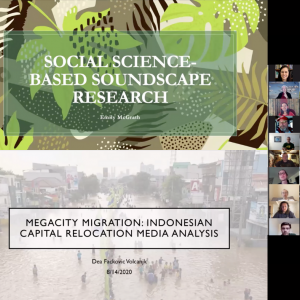Migrations Virtual Interns Contribute to Megacity Migration Project
Emily McGrath ’22 and Dea Fackovic Volcanjk ’23 spent part of their summer giving Cornell migrations researchers a leg up on their fall research.
The undergraduates’ work evaluating media and scholarly conversations helped to shape the trajectory of Megacity Migration, a climate migration collaboration led by Holger Klinck in the Cornell Lab of Ornithology. Funded by Migrations: A Global Grand Challenge, part of Global Cornell, the multidisciplinary project explores how moving Indonesia’s capital from the flood-prone island of Java to biodiverse Borneo will change communities, forests, and ecosystems.McGrath and Volcanjk joined the international team to identify populations with a stake in the relocation and study the media’s impact, working under the direction of Wendy Erb, Lab of Ornithology postdoc, and Walker DePuy, doctoral candidate in conservation and anthropology at the University of Georgia.Expanding the contextual framework of the project in two specific areas – soundscape research and media coverage of the capital relocation – were the researchers’ top priorities for the internships, said Erb.
Soundscapes and Indigenous Voices
The Lab of Ornithology is a world leader in bioacoustics research. McGrath, a nutritional science major, evaluated soundscape research – an innovative way of reframing “noise” as how particular people and communities interpret their acoustic environment. She assessed materials written by or focusing on indigenous and marginalized communities, for a more diverse view of the capital city relocation and the changing soundscapes of all communities in its path.
“Instead of a purely computerized soundscape study, this project takes an anthropological approach and bridges the gap into the social sciences,” McGrath said. The experience provided invaluable practice in ethnographic and social science research, which is common in her major field.
McGrath’s analysis revealed a shortage of local and indigenous voices – and a “familiar overrepresentation of authors from the global north,” said DePuy. “Her review helped us improve our research design as we work with East Kalimantan scholars and area communities to integrate bioacoustics with local expertise.”
The lack of scholarly research integrating local ecological knowledge and soundscapes that McGrath discovered inspired Erb to develop a Fulbright ASEAN proposal to conduct ethno-bioacoustics research with traditional communities across Borneo, from Malaysia to Indonesia.The spin-off project will show how collaborative soundscape monitoring can help local communities understand and adapt to the impacts of climate migration while protecting indigenous livelihoods and knowledge systems. The work is part of a collaboration with Shorna Allred, associate professor in the Department of Natural Resources, who leads community-led research on cultural resilience with a Penan community in Sarawak.
Perceptions of the Capital City Relocation
Volcanjk, a chemistry major and the second intern, conducted a media analysis of the capital city relocation that helped the team understand who is driving the relocation, how the decision is being framed, and what impacts are highlighted. In her findings, she noticed discrepancies between the government’s focus and that of NGOs.
“The government tends to emphasize the economy and job opportunities,” she said. “They are mostly focusing on the logistics of the relocation – not on finding solutions for the current capital city. NGOs are concerned about environmental impacts and indigenous rights.”
For Erb, the finding highlighted the role of national politics in the decision. For these powerful stakeholders, economic benefits essentially trump other concerns, such as risks to endangered species and effects on local and indigenous communities.
DePuy and Victoria Beard, professor in the Department of City and Regional Planning, are building on Volcanjk’s research findings by conducting remote interviews this fall and winter with government, civil society, and academic actors in Indonesia and the United States. These interviews will provide valuable in-depth description and analysis of the capital city relocation’s political context and potential social and ecological impacts from a diverse range of experts, as well as stakeholders directly involved in the relocation process.
As the formal conclusion of the interns’ projects, McGrath and Volcanjk presented their work virtually to the Lab of Ornithology’s Center for Conservation Bioacoustics in August 2020.
By Megan DeMint

